
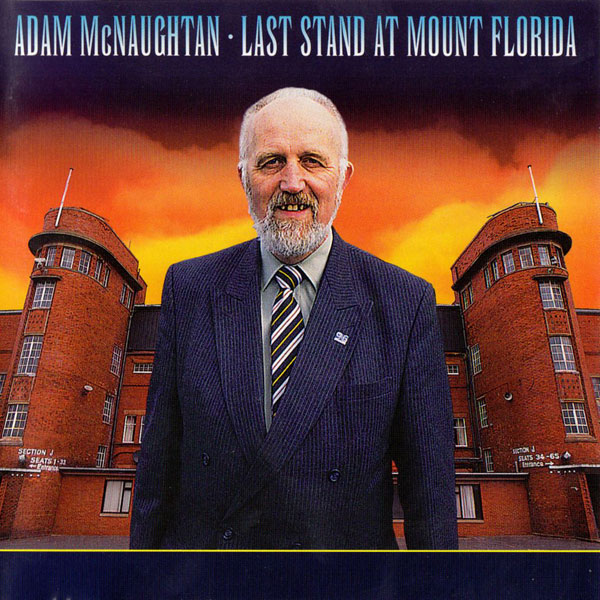 |
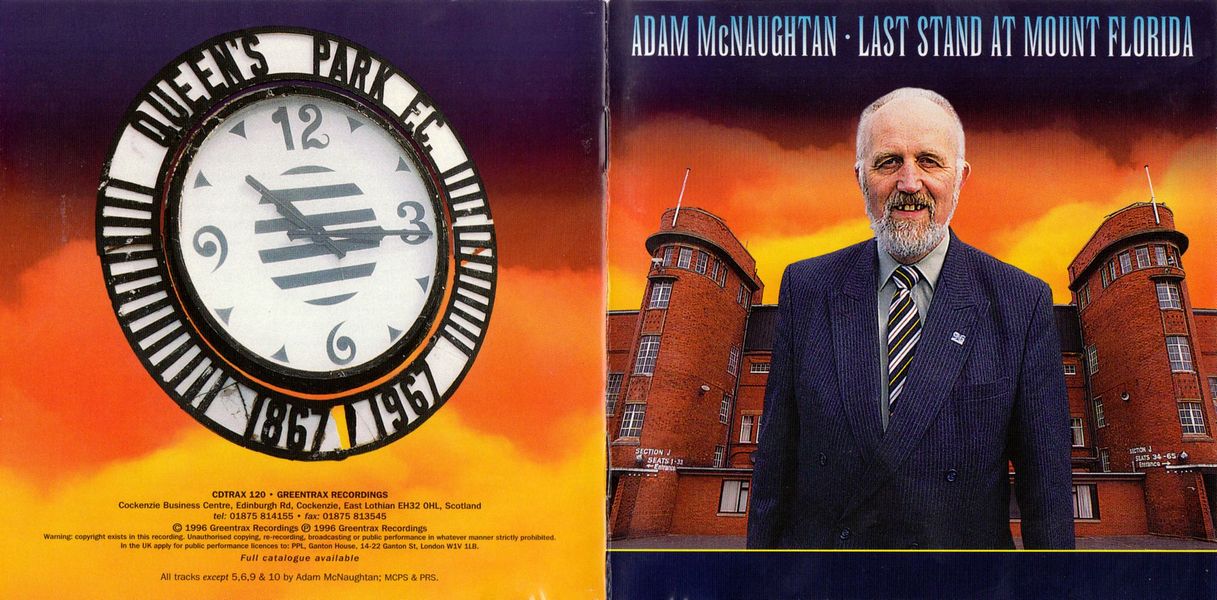
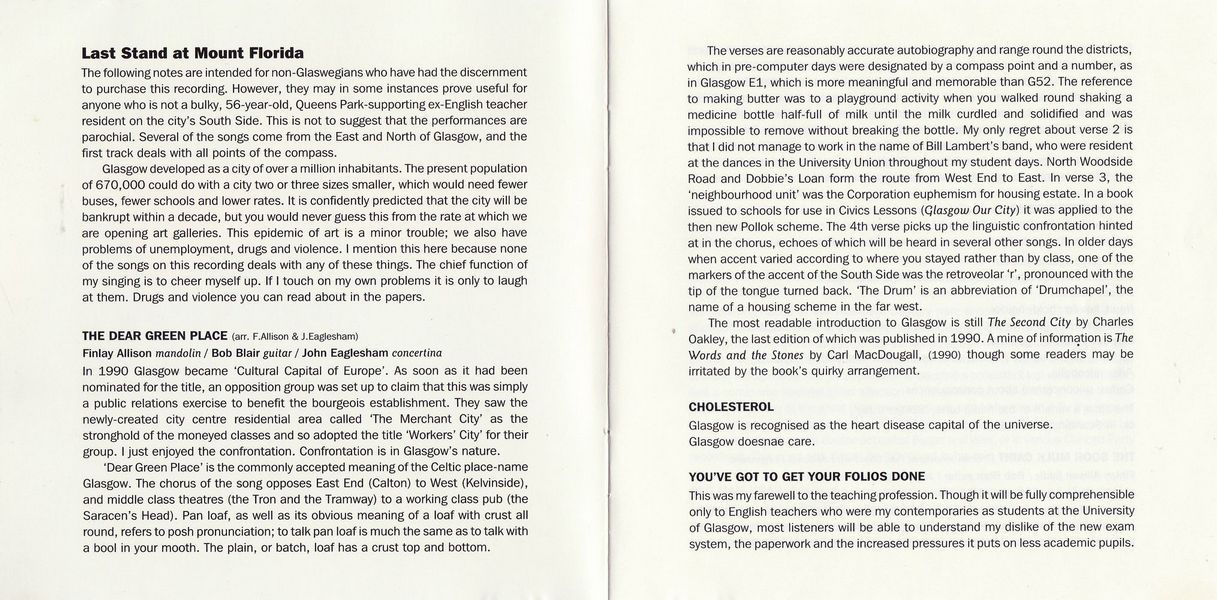
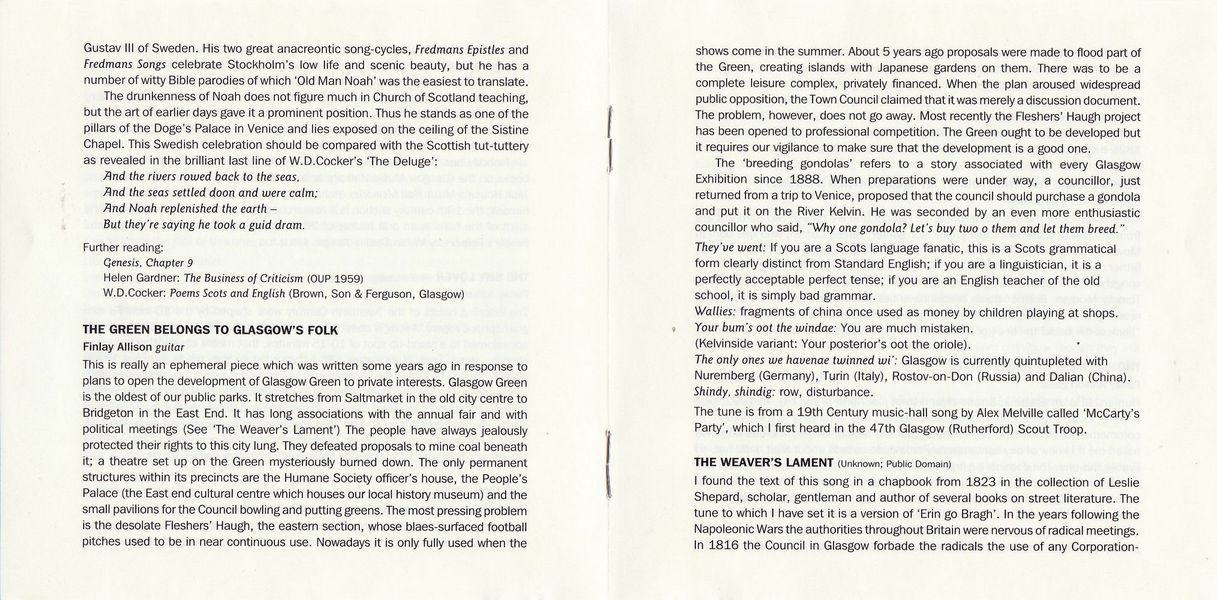
|
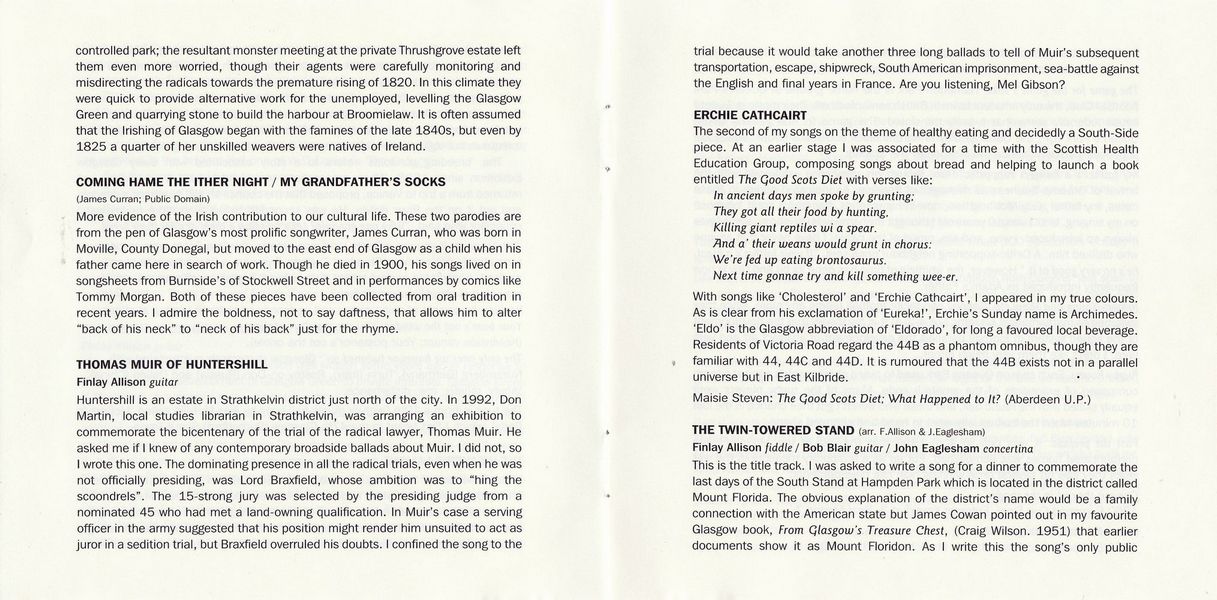
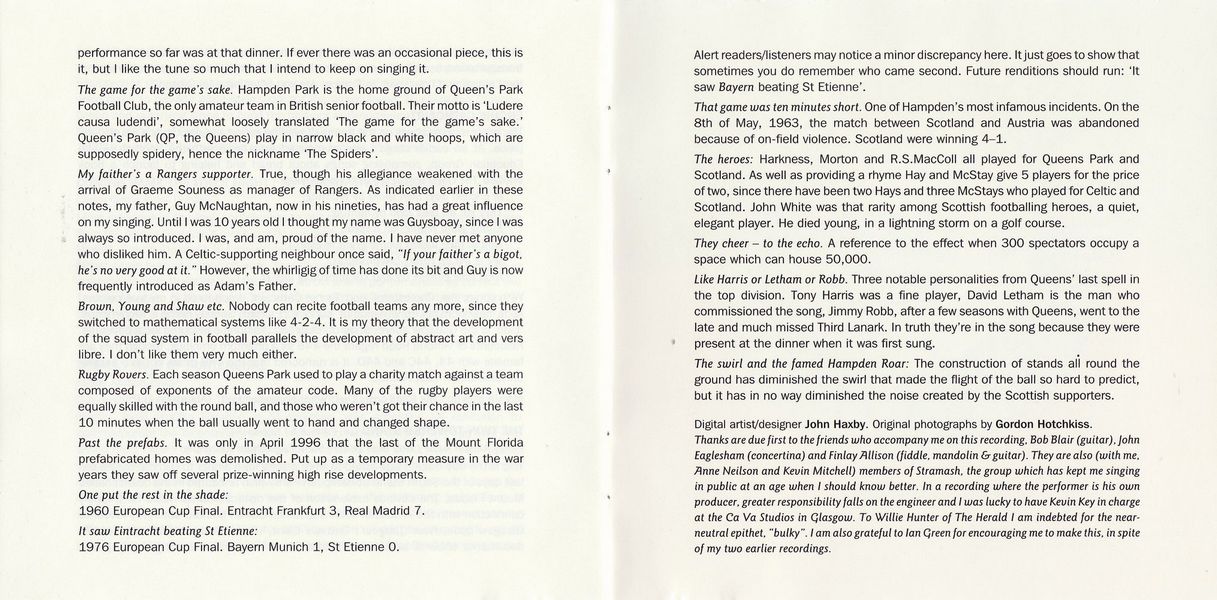 |
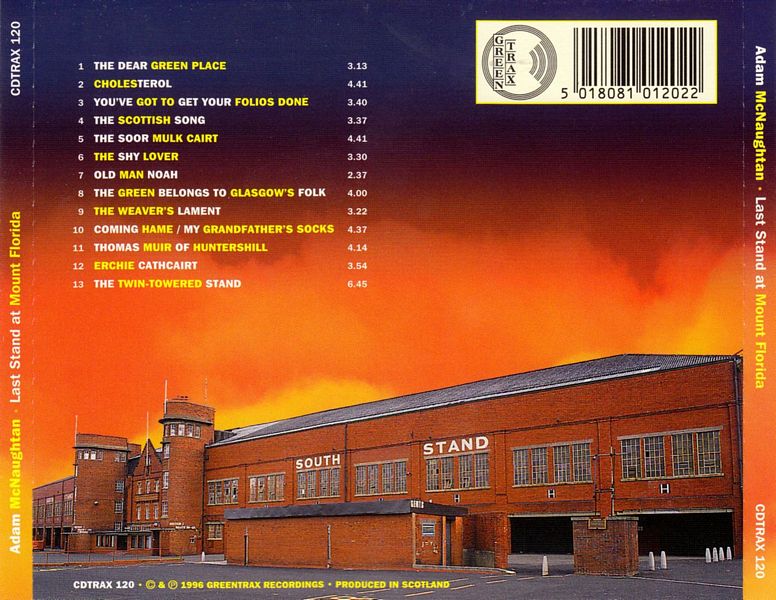
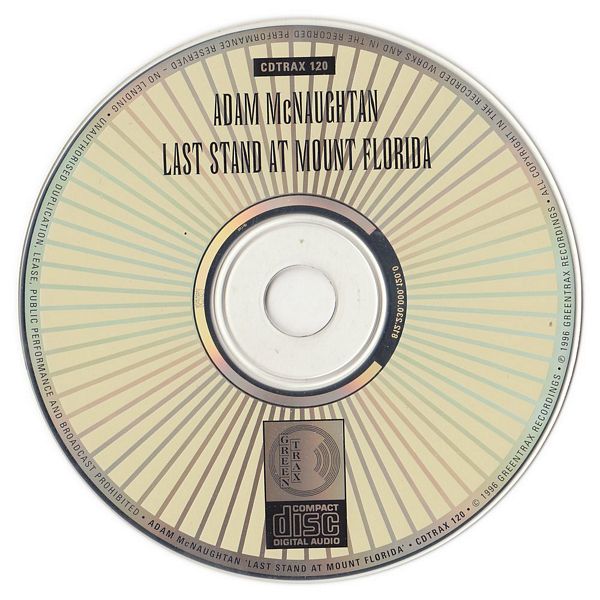
|
Last Stand at Mount Florida
The following notes are intended for non-Glaswegians who have had the discernment to purchase this recording. However, they may in some instances prove useful for anyone who is not a bulky, 56-year-old, Queens Park-supporting ex-English teacher resident on the city's South Side. This not to suggest that the performances are parochial. Several of the songs come from the East and North of Glasgow, and the first track deals with all points of the compass.
Glasgow developed as a city of over a million inhabitants. The present population of 670,000 could do with a city two or three sizes smaller, which would need fewer buses, fewer schools and lower rates. It is confidently predicted that the city will be bankrupt within a decade, but you would never guess this from the rate at which we are opening art galleries. This epidemic of art is a minor trouble; we also have problems of unemployment, drugs and violence. I mention this here because none of the songs on this recording deals with any of these things. The chief function of my singing is to cheer myself up. If I touch on my own problems it is only to laugh at them. Drugs and violence you can read about in the papers.
THE DEAR GREEN PLACE (arr. F. Allison & J. Eaglesham)
Finlay Allison: mandolin; Bob Blair: guitar; John Eaglesham: concertina
In 1990 Glasgow became 'Cultural Capital of Europe'. As soon as it had been nominated for the title, an opposition group was set up to claim that this was simply a public relations exercise to benefit the bourgeois establishment. They saw the newly-created city centre residential area called 'The Merchant City' as the stronghold of the moneyed classes and so adopted the title 'Workers' City' for their group. I just enjoyed the confrontation. Confrontation is in Glasgow's nature.
'Dear Green Place' is the commonly accepted meaning of the Celtic place-name Glasgow. The chorus of the song opposes East End (Calton) to West (Kelvinside), and middle class theatres (the Tron and the Tramway) to a working class pub (the Saracen's Head). Pan loaf, as well as its obvious meaning of a loaf with crust all round, refers to posh pronunciation; to talk pan loaf is much the same as to talk with a bool in your mooth. The plain, or batch, loaf has a crust top and bottom.
The verses are reasonably accurate autobiography and range round the districts, which in pre-computer days were designated by a compass point and a number, as in Glasgow El, which is more meaningful and memorable than G52. The reference to making butter was to a playground activity when you walked round shaking a medicine bottle half-full of milk until the milk curdled and solidified and was impossible to remove without breaking the bottle. My only regret about verse 2 is that I did not manage to work in the name of Bill Lambert's band, who were resident at the dances in the University Union throughout my student days. North Woodside Road and Dobbie's Loan form the route from West End to East. In verse 3, the 'neighbourhood unit' was the Corporation euphemism for housing estate. In a book issued to schools for use in Civics Lessons (Glasgow Our City) it was applied to the then new Pollok scheme. The 4th verse picks up the linguistic confrontation hinted at in the chorus, echoes of which will be heard in several other songs. In older days when accent varied according to where you stayed rather than by class, one of the markers of the accent of the South Side was the retroveolar 'r', pronounced with the tip of the tongue turned back. The Drum' is an abbreviation of 'Drumchapel', the name of a housing scheme in the far west.
The most readable introduction to Glasgow is still The Second City by Charles Oakley, the last edition of which was published in 1990. A mine of information is The Words and the Stones by Carl MacDougall, (1990) though some readers may be irritated by the book's quirky arrangement.
CHOLESTEROL
Glasgow is recognised as the heart disease capital of the universe.
Glasgow doesnae care.
YOU'VE GOT TO GET YOUR FOLIOS DONE
This was my farewell to the teaching profession. Though it will be fully comprehensible only to English teachers who were my contemporaries as students at the University of Glasgow, most listeners will be able to understand my dislike of the new exam system, the paperwork and the increased pressures it puts on less academic pupils.
Gustav III of Sweden. His two great anacreontic song-cycles, Fredmans Epistles and Fredmans Songs celebrate Stockholm's low life and scenic beauty, but he has a number of witty Bible parodies of which 'Old Man Noah' was the easiest to translate.
The drunkenness of Noah does not figure much in Church of Scotland teaching, but the art of earlier days gave it a prominent position. Thus he stands as one of the pillars of the Doge's Palace in Venice and lies exposed on the ceiling of the Sistine Chapel. This Swedish celebration should be compared with the Scottish tut-tuttery as revealed in the brilliant last line of W.D. Cocker's The Deluge':
And the rivers rowed back to the seas, And the seas settled doon and were calm; And Noah replenished the earth — But they're saying he took a guid dram.
Further reading:
Qenesis, Chapter 9 Helen Gardner: The Business of Criticism (OUP 1959) W.D. Cocker: Poems Scots and English (Brown, Son & Ferguson, Glasgow)
THE GREEN BELONGS TO GLASGOW'S FOLK
Finlay Allison guitar
This really an ephemeral piece which was written some years ago in response to plans to open the development of Glasgow Green to private interests. Glasgow Green is the oldest of our public parks. It stretches from Saltmarket in the old city centre to Bridgeton in the East End. It has long associations with the annual fair and with political meetings (See The Weaver's Lament') The people have always jealously protected their rights to this city lung. They defeated proposals to mine coal beneath it; a theatre set up on the Green mysteriously burned down. The only permanent structures within its precincts are the Humane Society officer's house, the People's Palace (the East end cultural centre which houses our local history museum) and the small pavilions for the Council bowling and putting greens. The most pressing problem is the desolate Fleshers' Haugh, the eastern section, whose blaes-surfaced football pitches used to be in near continuous use. Nowadays it is only fully used when the shows come in the summer. About 5 years ago proposals were made to flood part of the Green, creating islands with Japanese gardens on them. There was to be a complete leisure complex, privately financed. When the plan aroused widespread public opposition, the Town Council claimed that it was merely a discussion document. The problem, however, does not go away. Most recently the Fleshers' Haugh project has been opened to professional competition. The Green ought to be developed but it requires our vigilance to make sure that the development is a good one.
The 'breeding gondolas' refers to a story associated with every Glasgow Exhibition since 1888. When preparations were under way, a councillor, just returned from a trip to Venice, proposed that the council should purchase a gondola and put it on the River Kelvin. He was seconded by an even more enthusiastic councillor who said, "Why one gondola? Let's buy two o them and let them breed."
They've went: If you are a Scots language fanatic, this a Scots grammatical form clearly distinct from Standard English; if you are a linguistician, it is a perfectly acceptable perfect tense; if you are an English teacher of the old school, it is simply bad grammar.
Wallies: fragments of china once used as money by children playing at shops.
Your bum's oot the windae: You are much mistaken.
(Kelvinside variant: Your posterior's oot the oriole).
The only ones we havenae twinned wi': Glasgow is currently quintupleted with Nuremberg (DEU), Turin (Italy), Rostov-on-Don (Russia) and Dalian (China). Shindy, shindig: row, disturbance.
The tune is from a 19th Century music-hall song by Alex Melville called 'McCarty's Party', which I first heard in the 47th Glasgow (Rutherford) Scout Troop.
THE WEAVER'S LAMENT (Unknown; Public Domain)
I found the text of this song in a chapbook from 1823 in the collection of Leslie Shepard, scholar, gentleman and author of several books on street literature. The tune to which I have set it is a version of 'Erin go Bragh'. In the years following the Napoleonic Wars the authorities throughout Britain were nervous of radical meetings. In 1816 the Council in Glasgow forbade the radicals the use of any Corporation-controlled park; the resultant monster meeting at the private Thrushgrove estate left them even more worried, though their agents were carefully monitoring and misdirecting the radicals towards the premature rising of 1820. In this climate they were quick to provide alternative work for the unemployed, levelling the Glasgow Green and quarrying stone to build the harbour at Broomielaw. It is often assumed that the Irishing of Glasgow began with the famines of the late 1840s, but even by 1825 a quarter of her unskilled weavers were natives of Ireland.
COMING HAME THE ITHER NIGHT & MY GRANDFATHER'S SOCKS (James Curran; Public Domain)
More evidence of the Irish contribution to our cultural life. These two parodies are from the pen of Glasgow's most prolific songwriter, James Curran, who was born in Moville, County Donegal, but moved to the east end of Glasgow as a child when his father came here in search of work. Though he died in 1900, his songs lived on in songsheets from Burnside's of Stockwell Street and in performances by comics like Tommy Morgan. Both of these pieces have been collected from oral tradition in recent years. I admire the boldness, not to say daftness, that allows him to alter "back of his neck" to "neck of his back" just for the rhyme.
THOMAS MUIR OF HUNTERSHILL
Finlay Allison: guitar
Huntershill is an estate in Strathkelvin district just north of the city. In 1992, Don Martin, local studies librarian in Strathkelvin, was arranging an exhibition to commemorate the bicentenary of the trial of the radical lawyer, Thomas Muir. He asked me if I knew of any contemporary broadside ballads about Muir. I did not, so I wrote this one. The dominating presence in all the radical trials, even when he was not officially presiding, was Lord Braxfield, whose ambition was to "hing the scoondrels". The 15-strong jury was selected by the presiding judge from a nominated 45 who had met a land-owning qualification. In Muir's case a serving officer in the army suggested that his position might render him unsuited to act as juror in a sedition trial, but Braxfield overruled his doubts. I confined the song to the trial because it would take another three long ballads to tell of Muir's subsequent transportation, escape, shipwreck, South American imprisonment, sea-battle against the English and final years in France. Are you listening, Mel Gibson?
ERCHIE CATHCAIRT
The second of my songs on the theme of healthy eating and decidedly a South-Side piece. At an earlier stage I was associated for a time with the Scottish Health Education Group, composing songs about bread and helping to launch a book entitled The Good Scots Diet with verses like:
In ancient days men spoke by grunting;
They got all their food by hunting,
Killing giant reptiles wi a spear.
And a' their weans would grunt in chorus:
We're fed up eating brontosaurus.
Next time gonnae try and kill something wee-er.
With songs like 'Cholesterol' and 'Erchie Cathcairt', I appeared in my true colours. As is clear from his exclamation of 'Eureka!', Erchie's Sunday name is Archimedes. 'Eldo' is the Glasgow abbreviation of 'Eldorado', for long a favoured local beverage. Residents of Victoria Road regard the 44B as a phantom omnibus, though they are familiar with 44, 44C and 44D. It is rumoured that the 44B exists not in a parallel universe but in East Kilbride.
Maisie Steven: The Good Scots Diet; What Happened to It? (Aberdeen U.P.)
THE TWIN-TOWERED STAND (arr. F. Allison & J. Eaglesham)
Finlay Allison: fiddle; Bob Blair: guitar; John Eaglesham: concertina
This the title track. I was asked to write a song for a dinner to commemorate the last days of the South Stand at Hampden Park which is located in the district called Mount Florida. The obvious explanation of the district's name would be a family connection with the American state but James Cowan pointed out in my favourite Glasgow book, From Glasgow's Treasure Chest, (Craig Wilson. 1951) that earlier documents show it as Mount Floridon. As I write this the song's only public performance so far was at that dinner. If ever there was an occasional piece, this it, but I like the tune so much that I intend to keep on singing it.
The game for the game's sake. Hampden Park is the home ground of Queen's Park Football Club, the only amateur team in British senior football. Their motto is 'Ludere causa ludendi', somewhat loosely translated 'The game for the game's sake.' Queen's Park (QP, the Queens) play in narrow black and white hoops, which are supposedly spidery, hence the nickname 'The Spiders'.
My faither's a Rangers supporter. True, though his allegiance weakened with the arrival of Graeme Souness as manager of Rangers. As indicated earlier in these notes, my father, Guy McNaughtan, now in his nineties, has had a great influence on my singing. Until I was 10 years old I thought my name was Guysboay, since I was always so introduced. I was, and am, proud of the name. I have never met anyone who disliked him. A Celtic-supporting neighbour once said, "If your faither's a bigot he's no very good at it.'' However, the whirligig of time has done its bit and Guy is now frequently introduced as Adam's Father.
Brown, Young and Shaw etc. Nobody can recite football teams any more, since they switched to mathematical systems like 4-2-4. It is my theory that the development of the squad system in football parallels the development of abstract art and vers libre. I don't like them very much either.
Rugby Rovers. Each season Queens Park used to play a charity match against a team composed of exponents of the amateur code. Many of the rugby players were equally skilled with the round ball, and those who weren't got their chance in the last 10 minutes when the ball usually went to hand and changed shape.
Past the prefabs. It was only in April 1996 that the last of the Mount Florida prefabricated homes was demolished. Put up as a temporary measure in the war years they saw off several prize-winning high rise developments.
One put the rest in the shade:
1960 European Cup Final. Entracht Frankfurt 3, Real Madrid 7.
It saw Eintracht beating St Etienne: 1976 European Cup Final. Bayern Munich 1, St Etienne 0.
Alert readers/listeners may notice a minor discrepancy here. It just goes to show that sometimes you do remember who came second. Future renditions should run: 'It saw Bayern beating St Etienne'.
That game was ten minutes short. One of Hampden's most infamous incidents. On the 8th of May, 1963, the match between Scotland and Austria was abandoned because of on-field violence. Scotland were winning 4-1.
The heroes: Harkness, Morton and R.S. MacColl all played for Queens Park and Scotland. As well as providing a rhyme Hay and McStay give 5 players for the price of two, since there have been two Hays and three McStays who played for Celtic and Scotland. John White was that rarity among Scottish footballing heroes, a quiet, elegant player. He died young, in a lightning storm on a golf course.
They cheer — to the echo. A reference to the effect when 300 spectators occupy a space which can house 50,000.
Like Harris or Letham or Robb. Three notable personalities from Queens' last spell in the top division. Tony Harris was a fine player, David Letham is the man who commissioned the song, Jimmy Robb, after a few seasons with Queens, went to the late and much missed Third Lanark. In truth they're in the song because they were present at the dinner when it was first sung.
The swirl and the famed Hampden Roar: The construction of stands all round the ground has diminished the swirl that made the flight of the ball so hard to predict, but it has in no way diminished the noise created by the Scottish supporters.
Digital artist/designer John Haxby. Original photographs by Gordon Hotchkiss. Thanks are due first to the friends who accompany me on this recording, Bob Blair (guitar), John Eaglesham (concertina) and Finlay Allison (fiddle, mandolin & guitar). They are also (with me, Anne Neibon and Kevin Mitchell) members of Stramash, the group which has kept me singing in public at an age when I should know better. In a recording where the performer is his own producer, greater responsibility falls on the engineer and I was lucky to have Kevin Key in charge at the Ca Va Studios in Glasgow. To Willie Hunter of The Herald I am indebted for the nearneutral epithet, "bulky". I am also grateful to Ian Green for encouraging me to make this, in spite of my two earlier recordings.